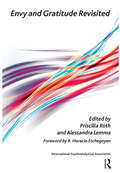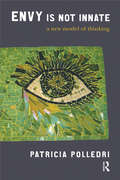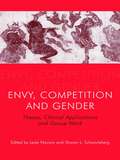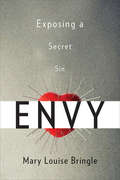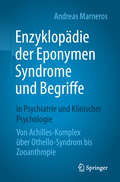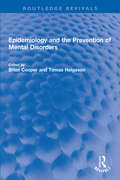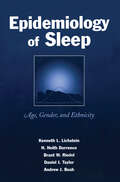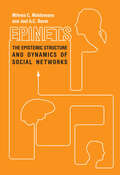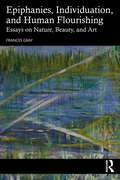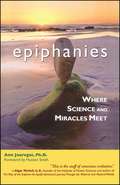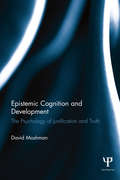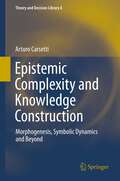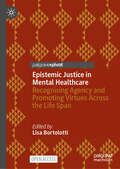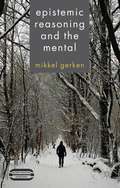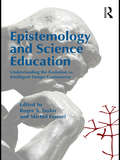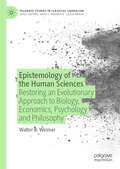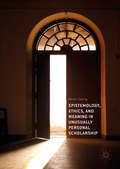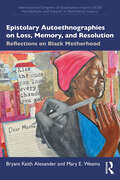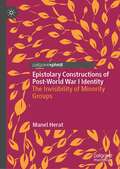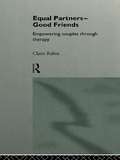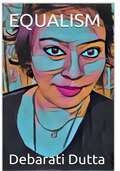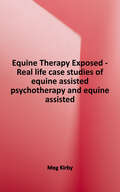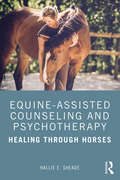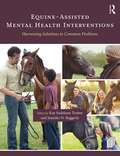- Table View
- List View
Envy and Gratitude Revisited (The International Psychoanalytical Association Psychoanalytic Ideas and Applications Series)
by Alessandra Lemma R. Horacio Etchegoyen Priscilla RothThese stimulating essays are evidence that 50 years after its publication Melanie Klein's Envy and Gratitude is still a rich source of psychoanalytic inspiration. Sixteen highly regarded analysts, representing a wide range of psychoanalytic thinking, provide new insights and highlight current developments without avoiding the controversies that surround the original publication. The clinical and literary material is engaging and illustrates the effect of theory on practice and the influence of practice on the evolution of theory.Contents:Foreword - R. Horacio EtchegoyenIntroduction - Priscilla Roth1) "Even now, now, very now . . ." On envy and the hatred of love - Ignes Sodre2) Envy, narcissism, and the destructive instinct - Robert Caper3) Envy and Gratitude: some current reflections - H. Shmuel Erlich4) An independent response to Envy and Gratitude - Caroline Polmear5) On gratitude - Edna O'Shaughnessy6) Keeping envy in mind: the vicissitudes of envy in adolescent motherhood - Alessandra Lemma7) Envy in Western society: today and tomorrow - Florence Guignard8) He thinks himself impaired: the pathologically envious personality - Ronald Britton9)
Envy is Not Innate: A New Model of Thinking (Forensic Psychotherapy Monograph Ser.)
by Patricia PolledriThis book is a comprehensive revision of the notion of envy, suggesting that envy is not innate and proposing some fresh ideas about its relation to psychopathology, offering a working model of development which is highly relevant to clinical practice.
Envy, Competition and Gender: Theory, Clinical Applications and Group Work
by Leyla Navaro Sharan L. SchwartzbergEnvy, Competition and Gender provides a unique perspective on gender difference in relation to envy and competitiveness, reframing and de-demonizing these difficult emotions and revealing their potentially creative power. Incorporating perspectives from psychology, psychiatry, social work, sociology and education, this book provides a comprehensive overview of theories and ideas on the links between gender, envy and competition. The book is divided into three sections, covering the individual and development, therapeutic implications and therapeutic applications in broader social and cultural contexts. Individual and group case stories are included throughout to illuminate discussion of crucial issues such as: men, masculinity, and competition gender differences in envying and being envied the evolution of the female self envy and generativity: owning our inner resources envy in body transference and countertransference envy and desire revenge and retaliation. This interdisciplinary, multicultural and international perspective on envy and competition in relation to gender will be of great interest to all psychotherapists and related mental health professionals interested in investigating the positive potential of these powerful emotions.
Envy: Exposing A Secret Sin
by Mary Louise BringleThe world has changed since the early Christian theologians named envy as one of the seven deadly sins, but it seems that the human heart has stayed much the same. Envy: Exposing a Secret Sin by Mary Louise Bringle finds that what once was viewed as destructive to the soul is now desirous. From the Texas woman who tried to kill the mother of her daughter's rival for a position on the cheerleading squad to the market's use of envy to sell everything from cars to cat food, the "green-eyed monster" is alive and well. Perhaps the only thing that's changed is our attitude to envy. <p><p> In this illuminating and lively volume, Bringle examines the evolution of envy from something to be avoided to something to be achieved. Drawing on a variety of sources from Gregory the Great to Cinderella, from Hieronymous Bosch to Vogue magazine, she explores ways to avoid the dangers of envy by reminding us of the ancient cure for this disease of the soul: gratitude.
Enzyklopädie der Eponymen Syndrome und Begriffe in Psychiatrie und Klinischer Psychologie: Von Achilles-Komplex über Othello-Syndrom bis Zooanthropie
by Andreas MarnerosEponyme Bezeichnungen haben den großen praktischen Vorteil, dass sie komplexe Begriffe und Konstellationen mit einer einzigen Bezeichnung erfassen. Das bietet Ärztinnen und Ärzten, Psychologinnen und Psychologen als auch Studierenden eine nicht zu unterschätzende Gedächtnishilfe. Zudem steht hinter einem psychiatrischen oder psychologischen Eponym nicht nur ein klinisches Bild oder eine psychopathologische Konstellation, sondern auch ein Mythos, eine Geschichte oder eine Biographie, sprich ein kultureller Hintergrund. Eine Expedition in das Reich der Eponyme bedeutet daher nicht nur die Begegnung mit Wissen, sondern auch eine Berührung mit alter und neuer Kultur. Jeder Begriff wird sowohl in seinem psychiatrisch-psychologischen Kontext als auch in seinem kulturellen Ursprung erläutert. So ergibt sich ein spannendes Gesamtbild aus bekannten und eher unbekannten Eponymen und Syndromen, die alle eine Geschichte erzählen.
Epidemiology and the Prevention of Mental Disorders (Routledge Revivals)
by Brian Cooper To 769 Mas HelgasonFirst published in 1989, Epidemiology and the Prevention of Mental Disorders examines the research undertaken into the methods for studying the occurrence of mental illness in populations during the twenty years prior to publication. The book explores the incidence and distribution of conditions such as schizophrenia, depression, alcoholism, addiction, and dementia across populations, and the risk factors with which they are associated. Taking a public health approach to the prevention of mental illness, the book reports on epidemiological research in psychiatry, emphasising its use in preventative terms, and making connections between its use in psychiatry and its use in other fields of medicine. It also comments on the development of psychiatric epidemiology as a public health discipline and draws attention to the implications of contemporary changes to biological and social environments on mental health. Epidemiology and the Prevention of Mental Disorders will appeal to those with an interest in the history of psychiatric epidemiology and mental health.
Epidemiology of Sleep: Age, Gender, and Ethnicity
by Kenneth L. Lichstein H. Heith Durrence Brant W. Riedel Daniel J. Taylor Andrew J. BushWhat is the prevalence of insomnia in a particular age group, in men and women, or in Caucasians and African Americans? What is the average total sleep time among normal sleepers among these groups? How does the sleep of Caucasians and African Americans differ? These are just some of the questions addressed in The Epidemiology of Sleep. This new book presents the most detailed and comprehensive archive of normal and abnormal sleep patterns. Based on a landmark study supported by the National Institute on Aging, 772 subjects from a host of populations including men, women, and various age and ethnic groups, prepared detailed sleep diaries for a two-week period. The use of these sleep diaries yielded a plethora of data on such characteristics as normal sleep patterns, various forms of insomnia, fatigue, depression, anxiety, and daytime sleepiness differentiated by age, sex, and ethnicity. The results generated by these data, charted in the book's numerous tables and graphs, provide a critical methodological advance in the sleep literature. The Epidemiology of Sleep opens with an overview of the rationale and unique characteristics of the study. This is followed by a comprehensive review of the existing epidemiological literature on sleep. Chapter three presents a detailed description of the methods used in the survey followed by meticulous information on the epidemiology of normal and insomnia sleep, that is unparalleled in the literature. Chapter six provides an archive of sleep patterns among African Americans. The book concludes with a discussion and interpretation of the most interesting findings. This insightful study, coupled with the comprehensive review of the existing literature on the epidemiology of sleep, make this volume an invaluable resource for sleep researchers, clinicians, health and clinical psychologists, gerontologists, epidemiologists, and advanced students.
Epileptische Anfälle und Epilepsien im Erwachsenenalter: Diagnostik und Therapie
by Hermann Stefan Friedhelm C. Schmitt Martin HoltkampDas Buch bietet dem Behandler einen Überblick über die gängigen klinisch relevanten Konzepte sowie diagnostischen und therapeutischen Maßnahmen in der Epileptologie. Mit seinem praxisorientierten Aufbau befähigt das Werk dazu, dieses Wissen im klinischen Kontext direkt anzuwenden.Zahlreiche Kasuistiken beantworten über die Kapitel hinweg typische Fragen zu Differenzialdiagnostik, Therapie und sozialmedizinischen Aspekten. Bei den Therapien kommen sowohl medikamentöse als auch operative Ansätze zur Sprache. Ein ballastfreies Buch, geschrieben von Epilepsie-Experten aus Deutschland, Österreich und der Schweiz, das sich den konkreten klinischen Aspekten widmet und dabei die entsprechenden nationalen und internationalen Leitlinien berücksichtigt.
Epinets: The Epistemic Structure and Dynamics of Social Networks
by Mihnea C. Moldoveanu Joel A.C. BaumEpinets presents a new way to think about social networks, which focuses on the knowledge that underlies our social interactions. Guiding readers through the web of beliefs that networked individuals have about each other and probing into what others think, this book illuminates the deeper character and influence of relationships among social network participants. Drawing on artificial intelligence, the philosophy of language, and epistemic game theory, Moldoveanu and Baum formulate a lexicon and array of conceptual tools that enable readers to explain, predict, and shape the fabric and behavior of social networks. With an innovative and strategically-minded look at the assumptions that enable and clog our networks, this book lays the groundwork for a leap forward in our understanding of human relations.
Epiphanies, Individuation, and Human Flourishing: Essays on Nature, Beauty, and Art
by Frances GrayWithin this book, Gray argues that moments of profound existential importance are given to us in the presence of Art, and that such moments are important motivators in our personal, civic, and moral lives. Using the work of Jung, Freud, Berger, and Nussbaum, this book looks to Art in its theory and practice as a driver of psychic epiphany. Examining music, environment, architecture, poetry, and painting, it traces the relationship between the ordinary and the extraordinary, showing how we can and do locate ourselves beyond our own psyches in a world of artistic endeavour. Gray concludes that Art plays a critical role in psychological practice and human flourishing on an individual and collective level. Epiphanies, Individuation, and Human Flourishing will appeal to artists, art theorists, therapists, and analysts as a teaching tool that demonstrates the possible connections that can be made among the arts, sciences and psycho-therapeutic communities, and Nature.
Epiphanies: Where Science and Miracles Meet
by Huston Smith Ann JaureguiIn a quiet moment of therapy, a breakthrough comes -- the miracle of the new. To experience an epiphany is to have sudden insight into the essential meaning of something, unleashed sometimes in exquisitely slow motion, sometimes in a flash. In an intimate, lyrical integration of the science of psychology and transcendence of spirituality, celebrated clinician Dr. Ann Jauregui introduces us to nine individuals who have undergone astonishing transformations by exploring a world quite different from the one described by our five senses. With moments of miraculous and joyful surprise, Epiphanies exposes a reality outside of everyday existence that has momentous implications for life's ultimate questions. "Shyly we venture out with these stories," Dr. Jauregui writes, "into a world where science itself is struggling to describe a realm out of time and space and language." We are the beneficiaries of these extraordinary shifts of perspective, invited into a sparkling conversation that allows us to see the potential residing in all of us.
Epistemic Cognition and Development: The Psychology of Justification and Truth
by David MoshmanEpistemic cognition, the philosophical core of metacognition, concerns people’s knowledge about the justification and truth of beliefs. Multiple literatures in psychology and education address aspects of epistemic cognition. In the absence of a coherent conceptual framework, however, these literatures mostly fail to communicate with each other and often connect only loosely to genuine epistemology. This complicates any effort to achieve a systematic theoretical understanding of epistemic cognition and its development. Deanna Kuhn writes in her foreword, "Moshman is not the first to take on this challenge, but he fulfills it elegantly and, I think, the most comprehensively and astutely." After reviewing the basics of philosophical epistemology and cognitive psychology, Epistemic Cognition and Development provides a compelling account of developmental change across childhood and beyond in knowledge about knowledge, especially with regard to fundamental conceptions of objectivity, subjectivity, rationality, justification, and truth. This is followed by detailed consideration of domain-specific epistemologies of science, logic, morality, social convention, history, and identity, including associated forms of reasoning. The final section provides theoretical conclusions, educational and social applications, and suggestions for further research.
Epistemic Complexity and Knowledge Construction
by A. CarsettiThe volume as its first target aims at clarifying that peculiar entanglement of complexity, causality, meaning, emergence and intentionality that characterises the unfolding of the "natural forms" of human cognition As is well known, cognition is not only a self-organising process. It is also a co-operative and coupled process. If we consider the external environment as a complex, multiple and stratified Source which interacts with the nervous system, we can easily realise that the cognitive activities devoted to the "intelligent" search for the depth information living in the Source, may determine the very change of the complexity conditions according to which the Source progressively expresses its "wild" action. In this sense, simulation models are not neutral or purely speculative: the true cognition actually appears to be necessarily connected with successful forms of reading, those forms, in particular, that permit a specific coherent unfolding of the deep information content of the Source. Therefore, the simulation models, if valid, materialise as "creative" channels, i.e., as autonomous functional systems, as the very roots of a new possible development of the entire system represented by mind and its Reality. From a general point of view, the objectivity of Reality is also proportionate to the autonomy reached by cognitive processes. In this sense, at the level of cultural evolution, reference procedures act as guide, mirror and canalisation with respect to primary information flows and involved selective forces: they offer themselves as the actual instruments for the constant renewal of the code, for the invention and the actual articulation of an ever-new incompressibility. From an effective point of view, they appear as indissolubly linked to the successive definition of specific (and innovative) measures of the epistemic complexity. These measures cannot concern only statistical rarity (Shannon) or computational incompressibility (Kolmogorov-Chaitin), on the contrary they should also be able to take into account the coupled connection between the Source and the cognitive agent, the evolution of this connection as well as the successive constitution of meaning as symbolic form. Hence the possible (and necessary) definition of new axiomatic systems, new measure spaces, the real displaying of processes of continuous reorganisation at the semantic level. Indeed, it is only through a complete, first-order "reduction" and a correlated non-standard second-order analysis that new incompressibility will actually manifest itself. Therefore, the reference procedures appear to be related to a process of multiplication of minds, as well as to a process of "clarification" of meanings which finally emerges as vision via principles.
Epistemic Justice in Mental Healthcare: Recognising Agency and Promoting Virtues Across the Life Span
by Lisa BortolottiThis open access book explores epistemic justice in mental healthcare, bringing together perspectives from psychologists, psychiatrists, philosophers, activists, and lived experience researchers. Through eight chapters, authors identify threats to the agency of people who hear voices, experience depression, have psychotic symptoms, live with dementia, are diagnosed with personality disorders, and face serious mental health issues while receiving palliative care. Considering the power asymmetries in clinical interactions, where patients are vulnerable and healthcare professionals are uniquely placed to offer support, this book reaffirms the importance of recognizing patients as agents and collaborators. Topics covered include trust in the therapeutic relationship, dignity at the end of life, the social dimension of health, stigma in an acute ward, the harm caused by biases and stereotypes, the role of clinical communication, and the promise of digital health. Students, academic researchers, practitioners, as well as mental health charities will benefit from this timely collection.
Epistemic Reasoning And The Mental
by Mikkel GerkenEpistemic Reasoning and the Mental integrates the epistemology of reasoning and philosophy of mind. The book contains introductions to basic concepts in the epistemology of inference and to important aspects of the philosophy of mind. By examining the fundamental competencies involved in reasoning, Gerken argues that reasoning's epistemic force depends on the external environment in ways that are both surprising and epistemologically important. For example, Gerken argues that purportedly deductive reasoning that exhibits the fallacy of equivocation may nevertheless transmit epistemic warrant from its premise-beliefs to its conclusion-belief. This view is contrary to orthodoxy according to which such reasoning must be valid. But Gerken shows how this novel and unorthodox view is integrated in a psychologically plausible account of our reasoning competencies and a general epistemological framework. What emerges is an approach to the philosophy of reasoning that is informed and constrained by both epistemology and philosophy of mind.
Epistemology and Science Education: Understanding the Evolution vs. Intelligent Design Controversy
by Michel Ferrari Roger S. TaylorHow is epistemology related to the issue of teaching science and evolution in the schools? Addressing a flashpoint issue in our schools today, this book explores core epistemological differences between proponents of intelligent design and evolutionary scientists, as well as the critical role of epistemological beliefs in learning science. Preeminent scholars in these areas report empirical research and/or make a theoretical contribution, with a particular emphasis on the controversy over whether intelligent design deserves to be considered a science alongside Darwinian evolution. This pioneering book coordinates and provides a complete picture of the intersections in the study of evolution, epistemology, and science education, in order to allow a deeper understanding of the intelligent design vs. evolution controversy. This is a very timely book for teachers and policy makers who are wrestling with issues of how to teach biology and evolution within a cultural context in which intelligent design has been and is likely to remain a challenge for the foreseeable future.
Epistemology of the Human Sciences: Restoring an Evolutionary Approach to Biology, Economics, Psychology and Philosophy (Palgrave Studies in Classical Liberalism)
by Walter B. WeimerThis book argues for evolutionary epistemology and distinguishing functionality from physicality in the social sciences. It explores the implications for this approach to understanding in biology, economics, psychology and political science. Presenting a comprehensive overview of philosophical topics in the social sciences, the book emphasizes how all human cognition and behavior is characterized by functionality and complexity, and thus cannot be explained by the point predictions and exact laws found in the physical sciences. Realms of functional complexity – such as the market order in economics, the social rules of conduct, and the human CNS – require a focus on explanations of the principles involved rather than predicting exact outcomes. This requires study of the historical context to understand behavior and cognition. This approach notes that functional complexity is central to classical liberal ideas such as division of labour and knowledge, and how this is a far more powerful and adequate account of social organization than central planning. Through comparison of these approaches, as well as its interdisciplinary scope, this book will interest both academics and students in philosophy, biology, economics, psychology and all other social sciences.
Epistemology, Ethics, and Meaning in Unusually Personal Scholarship
by Amber EspingThis book uses Viktor Frankl’s Existential Psychology (logotherapy) to explore the ways some professors use unusually personal scholarship to discover meaning in personal adversity. A psychiatrist imprisoned for three years in Nazi concentration camps, Frankl believed the search for meaning is a powerful motivator, and that its discovery can be profoundly therapeutic. Part I begins with four stories of professors finding meaning. Using the case studies as a foundation, Part II investigates issues of epistemology and ethics in unusually personal research from an existential perspective. The book offers advice for graduate students and faculty who want to live and work more meaningfully in the academy.
Epistolary Autoethnographies on Loss, Memory, and Resolution: Reflections on Black Motherhood (International Congress of Qualitative Inquiry (ICQI) Foundations and Futures in Qualitative Inquiry)
by Bryant Keith Alexander Mary E. WeemsThis book uses letter writing as a form of engaging autoethnography to address relational histories and dynamics such as race, gender, loss, memory and resolution.It is structured around textual performances, poems, and dialogues in the form of letters. Set within the context of adult Black children and their Black mothers, each author uses their letters to reflect on life with and without mama, and their own sense of coming to know themselves in the absence of their mother. Each entry evidence encounters of pain, possibility, and potentiality collated between the authors for a robust thematic underpinning for the reader. Building upon poetic inquiry and autoethnography narratives, this book seeks to build arguments about privatized struggle, and offers a guide on reflection.In addition to students and researchers partaking in autoethnographical studies, this book is suitable for anyone studying qualitative inquiry, performance studies, gender studies, cultural studies, Black studies, anthropology, and performative writing.
Epistolary Constructions of Post-World War I Identity: The Invisibility of Minority Groups
by Manel HeratThis book analyses the letters of marginalised groups of World War I soldiers - including Black, Indian and disabled ex-servicemen - from a linguistic perspective, looking at issues such as descriptions of disability, identity and migration, dealing with minority groups who have long been rendered invisible, and exploring how these writers position themselves in relation to the 'other'. The author makes use of a corpus-assisted approach to examine identity construction and performance, shedding light on a previously under-explored demographic. This book will be of interest to students and scholars of World War I history, language and identity, psychological and physical disability, as well as readers seeking a fresh angle on a key period of 20th century history.
Equal Partners - Good Friends: Empowering Couples Through Therapy
by Claire RabinMarriage as an equal partnership is the goal of amny couples in the western world today and yet equality is often limited by the ways that power and gender interact in the relationship, leading to dissatisfaction and ultimately the break up of the marriage. In Equal PArtners - Good Friends Claire Rabin examines the connection between inequality in marriage and marital distress. Drawing on extensive research and personal interviews in the UK, USA and Israel, she stresses the role of friendship in establishing a truly equal relationship. Focusing on issues of gender, sex roles and power, she provides a new clinical treatment model for therapists working with couples which is much needed in today's climate of change.
Equalism
by Debarati DuttaHUMANITY IS THE FIRST THING.. READ AND THINK, MOTIVATE POSITIVELY, FAULT LIES IN THE BASIC CAUSE, WHICH CAUSE DEPRESSION, UNHAPPINES, ILL MENTAL HEALTH . ELEMINATE IT AND LIVE HAPPY..
Equine Therapy Exposed: Real life case studies of equine assisted psychotherapy and equine assisted learning with everyday people and horses
by Meggin KirbyIn this book, you will get a sneak peek and deep dive into the emerging professional practice of equine-assisted therapy. This unique, beautifully presented, and engaging book provides real-life case studies with diverse clients and delivers insight from one of Australia's leading education experts in Equine Assisted Psychotherapy and Animal Assisted Psychotherapy. Meg Kirby (BA, MASW, DIP. GESTALT THERAPY) is a Mental Health Social Worker of 25 years, and international education expert in equine assisted psychotherapy, author, founder, senior trainer, and supervisor at The Equine Psychotherapy Institute. When Meg is not training students from all across the globe in equine, animal, and nature-assisted psychotherapy, she spends her time caring for 12 family herd members, three cats, dog "Bear," and rabbit, Darcy... not forgetting her loving husband and two beautiful daughters, Rose and Jasmine. Meg lives and breathes the wisdom of animals and nature.
Equine-Assisted Counseling and Psychotherapy: Healing Through Horses
by Hallie E. SheadeEquine-Assisted Counseling and Psychotherapy offers a comprehensive guide to the practice of working with equines in a psychotherapeutic setting. Chapters provide a research-informed approach to integrating the contributions of horses and other equines into mental health services. With a focus on equine welfare, the book uses a relational approach to explore a broad range of topics, including documentation and treatment planning, work with clients across the lifespan and with diverse needs, complexities related to horses in the therapeutic relationship, as well as ethical, legal, and best-practice considerations. Mental health and equine professionals will come away from the book with a strong understanding of both the theoretical and practical aspects of equine-assisted counseling.
Equine-Assisted Mental Health Interventions: Harnessing Solutions to Common Problems
by Kay Sudekum Trotter Jennifer N. BaggerlyWritten by internationally renowned equine-assisted mental health professionals, this edited collection teaches counselors how to design and implement equine-assisted mental health interventions for different populations and various challenges. Supported by ethical considerations and theoretical frameworks, chapters cover common issues including depression, anxiety, grief, ADHD, autism, eating disorders, substance abuse, self-esteem, social skills and communication, couples and family work, and professional development. Each chapter provides practical tips for implementing treatment strategies, case studies with transcript analyses, and sample session notes. This book will appeal to both the expert equine-assisted mental health counselor and the seasoned counselor who is open to partnering with an equine practitioner to help their clients in new and innovative ways.
